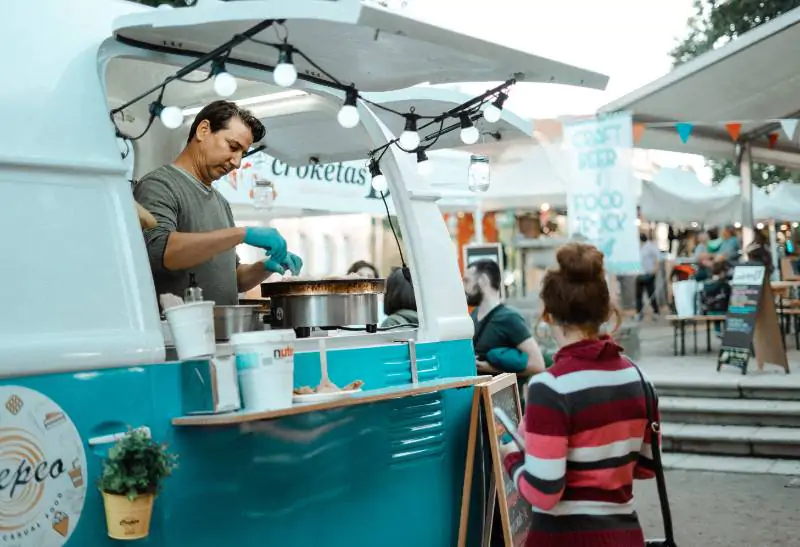Table of Contents
The allure of the open road, the rich aroma of freshly brewed coffee, and the freedom of being your own boss – it’s no wonder the coffee van business model is steaming ahead in popularity across the UK. Offering a significantly lower barrier to entry than a traditional bricks-and-mortar café, a mobile coffee venture taps into the nation’s enduring love affair with quality caffeine. Targeting busy commuters, event attendees, office workers, festival crowds, and local communities, a well-run coffee van boasts impressive profit potential. The key advantage? Unmatched flexibility and mobility. You can chase the footfall, adapt to seasons and events, test different locations with minimal risk, and build a brand that moves with your customers. If you’re passionate about coffee and crave entrepreneurial independence, this guide unpacks how to start a coffee van business UK.
Understanding How to Start a Coffee Van Business UK
A coffee van is essentially a compact, fully-equipped café on wheels. Its success hinges on strategic location, high-quality products, efficient service, and strong branding. Unlike fixed cafés, your overheads are dramatically lower – no hefty commercial rents or lengthy leases. Your primary asset is the van itself. Profitability stems from high-volume sales of relatively low-cost items (coffee being the star, supplemented by teas, pastries, and snacks) at convenient spots. The model thrives on repeat custom from regulars at static pitches (like business parks or market squares) and high-volume spikes at events. Understanding this dynamic – the blend of scheduled pitches and opportunistic event bookings – is fundamental.
Market Research and Planning: Know Your Ground
Jumping in without research is a recipe for lukewarm results. Thorough market research is your essential first brew:
- Identify Your Niche & Customers: Who are you serving? Office workers needing a morning fix? Parents at school gates? Event-goers? Tradespeople on industrial estates? Understand their preferences (specialty coffee vs. speed, price sensitivity, popular products).
- Location Scouting: Where is the demand? Analyse footfall at potential pitches at different times and days. Talk to local councils about pitch availability and regulations. Identify gaps where good coffee is lacking.
- Competitor Analysis: Who else is operating nearby? What are their strengths and weaknesses (price, product quality, service speed, branding)? How can you differentiate?
- Assess Demand: Is there genuine, consistent demand in your chosen locations? Consider seasonality and alternative pitches for quieter periods.
This research forms the bedrock of your business plan. This crucial document should detail your concept, target market, competition analysis, marketing strategy, financial projections (startup costs, operating costs, sales forecasts, break-even analysis), operational plan (suppliers, staffing, daily routines), and long-term goals. A solid plan is vital for securing finance and keeping you on track.
Legal Requirements and Licenses: Staying Compliant
Operating legally is non-negotiable in the food and beverage industry. Key requirements for how to start a coffee van business UK include:
- Vehicle Registration & Insurance: Ensure your van is correctly registered as a food vehicle. Obtain comprehensive business insurance, including public liability and vehicle cover.
- Food Business Registration: Register your mobile food business with the Environmental Health department of your local council at least 28 days before trading. This is mandatory.
- Food Hygiene Rating: Prepare for unannounced inspections by Environmental Health Officers. You’ll need a documented Food Safety Management System (like Safer Food, Better Business). Aim for a 5-star rating – display it proudly!
- Street Trading Licence/Pavement Licence: Permission to trade on public land varies hugely by local council. You’ll likely need a street trading licence or a pavement licence for specific pitches. Fees and application processes differ – contact your council early.
- Event Permissions: For private land (festivals, markets, business parks), you’ll need permission from the landowner or event organiser.
- Gas Safety: If using gas appliances (common for coffee machines), ensure regular safety checks by a Gas Safe registered engineer.
- Waste Disposal: Have contracts in place for responsible disposal of coffee grounds, food waste, and general waste. You have a legal duty of care.
Choosing the Right Equipment and Suppliers
Your van’s equipment is your production line. Invest wisely for reliability and quality:
- The Van: Choose a reliable base vehicle (often a medium or large van) considering payload capacity, fuel efficiency, and ease of conversion. Professional fit-out is essential for workflow, safety, and insulation.
- Coffee Machine: The heart of your operation. Prioritise commercial-grade, durable machines suitable for high-volume use. Consider manual, semi-automatic, or super-automatic based on your skill level and budget (e.g., La Marzocco, Nuova Simonelli, Victoria Arduino). Ensure it fits the van!
- Grinder: Essential for fresh beans. Invest in a high-quality commercial burr grinder.
- Water System: A clean, pressurised water supply and waste tank are crucial. Consider water filtration for better coffee taste and machine longevity.
- Refrigeration: Adequate fridge/freezer space for milk, pastries, and other perishables.
- Generator/Power: Most vans require a generator (often diesel or LPG) to power equipment. Ensure sufficient output and consider noise levels. Alternatively, explore battery/solar options where feasible.
- Ancillary Equipment: Till system (ideally mobile card reader integrated), hand wash basin (mandatory with hot water), cleaning supplies, cups, lids, stirrers, etc.
Sourcing Suppliers: Build relationships with reputable wholesalers for coffee beans, milk, syrups, pastries, cups, and cleaning supplies. Focus on quality and consistency, especially for your core coffee beans. Consider local bakeries for fresh pastries. Negotiate prices as your volume grows. Understanding how to start a coffee van business UK involves mastering these supply chains.
Launching Your Coffee Van Business: Hitting the Road
With planning, permits, and kit in place, it’s launch time!
- Branding: Create a memorable name, logo, and van livery. Your van is your shopfront – make it eye-catching and reflect your brand’s personality (e.g., modern, artisan, fun).
- Vehicle Prep: Ensure the van is mechanically sound, fully equipped, stocked, and sparkling clean.
- Marketing & Promotion:
- Social Media: Instagram and Facebook are vital. Showcase your van, coffee, locations, and personality. Use local hashtags (#LeedsCoffee, #ManchesterEats). Announce your launch and daily pitches.
- Local Advertising: Flyers in local businesses, posters on community boards. Partner with nearby offices or gyms.
- Online Presence: A simple website or Google Business Profile listing with your schedule, menu, and contact details is essential.
- Networking: Connect with event organisers, market managers, and local businesses.
- Soft Launch: Test your systems at a low-key event or friendly location before your big debut. Refine your workflow and menu based on feedback.
Financial Management and Pricing Strategy
Financial discipline is key to survival and growth:
- Startup Costs: Budget meticulously for the van (purchase/lease), conversion, equipment, initial stock, licenses, insurance, branding, and marketing. This can range from £20k to £70k+ depending on scale and quality.
- Operating Costs: Track everything: fuel, gas, ingredients, cups/lids, pitch fees, event fees, van maintenance, insurance, accounting fees, marketing, staff costs (if applicable), loan repayments.
- Pricing Strategy: Calculate your Cost of Goods Sold (COGS) per item. Factor in all overheads to determine your break-even point. Research competitor pricing. Aim for a healthy profit margin (typically 60-75% on coffee) while remaining competitive. Value perception matters – don’t just compete on price if you offer superior quality.
- Cash Flow: Manage this diligently. Mobile card payments are essential but incur fees. Have systems for tracking daily sales and expenses.
Customer Engagement and Experience
In a competitive market, experience wins:
- Speed & Efficiency: Master your workflow. Long queues deter customers. Aim for consistent quality even when busy.
- Friendliness & Consistency: A warm smile and remembering regulars’ orders builds loyalty. Be the “friendly face” of the morning commute.
- Quality is King: Never compromise on coffee bean quality, milk freshness, or preparation. A bad coffee loses customers permanently.
- Cleanliness: Impeccable hygiene inside and around the van is non-negotiable.
- Menu & Offerings: Have a clear, concise menu. Consider dietary needs (plant-based milks, gluten-free options). Seasonal specials can create buzz.
- Gather Feedback: Encourage reviews (Google, social media). Listen to customer suggestions. Adapt and improve.
- Loyalty Schemes: Simple stamp cards or digital loyalty apps encourage repeat business.
Conclusion: Key Takeaways for Success in the Coffee Van Business
Launching a coffee van business in the UK is an exciting and potentially rewarding venture that combines passion with practical entrepreneurship. Success hinges on meticulous planning – from deep market research and a robust business plan to navigating the essential legal landscape. Investing in reliable equipment and building strong supplier relationships ensures you can consistently deliver quality. Effective branding, strategic marketing (especially leveraging social media), and mastering your financials are crucial for visibility and profitability. Ultimately, the magic happens at the serving hatch: exceptional customer service, speed, and an engaging experience turn first-time buyers into loyal regulars. While the journey requires hard work, dedication, and resilience, the flexibility, community connection, and potential for strong returns make understanding how to start a coffee van business UK a compelling proposition. Brew your passion into a thriving mobile enterprise – the road to your coffee dream starts here.






